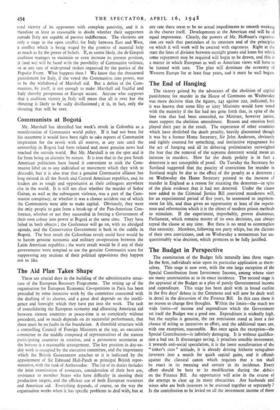The End of Hanging
The victory gained by the advocates of the abolition of capital punishment for murder in the House of Commons on Wednesday was more decisive than the figures, 245 against 222, indicated, for it was known that some fifty or sixty Ministers would have voted with the majority if the fiat had not gone forth that, in spite of the free vote that had been conceded, no Minister, however junior, must support the abolition amendment. Reason and emotion both played their part in the result. The experience of other countries which have abolished the death penalty, heavily discounted though it was by a former Home Secretary, Sir John Anderson, obviously and rightly counted for something, and instinctive repugnance for the act of hanging and all its debasing preliminaries outweighed the fear that the removal of the supreme deterrent would mean an increase in murders. How far the death perfalty is in fact a deterrent is not susceptible of proof. On Tuesday the Secretary for Scotland suggested that the paucity of convictions for murder in Scotland might be due to the effect of the penalty as a deterrent ; on Wednesday the Home Secretary pointed to the increase of murder in England as a reason for retaining the deterrent—in spite of the plain evidence that it had not deterred. Under the clause now added to the Criminal Justice Bill convicted murderers will, for an experimental period of five years, be sentenced to imprison- ment for life, and thus given an opportunity at least of the repent- ance and reformation which it is the object of modern prison methods to stimulate. If the experiment, improbably, proves disastrous, Parliament, which remains master of its own decisions, can always repeal the clause at anytime. But there is no need to contemplate that necessity. Members, following not party whips, but the dictates of their own convictions, took on Wednesday a momentous but un- questionably wise decision, which promises to be fully justified.






























 Previous page
Previous page